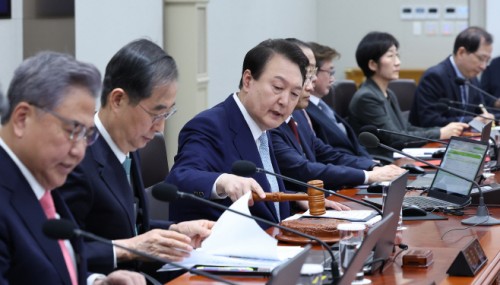 |
| President Yoon Suk-yeol opens the Cabinet meeting held at the presidential office in Yongsan, Seoul, on April 4, 2023./ Source: Yonhap |
AsiaToday reporter Lee Wook-jae
President Yoon Suk-yeol vetoed a revision of the Grain Management Act on Tuesday, calling it a “typical populist bill that is of no help to farmers or the development of farming villages.” The political deadlock is expected to intensify as the main opposition party is determined to put the bill to a vote again despite the president’s veto.
Yoon held a Cabinet meeting at the presidential office in Seoul earlier in the day and approved a request for a partial revision of the grain bill, saying, “The amendment to the act is a forced purchase of surplus rice, which requires the government to buy all of the surplus rice with huge taxpayer’s money, regardless of the amount of rice consumed in the market.” This marks the first veto by a Korean president in seven years. The most recent was in May 2016 when former President Park Geun-hye was in office.
With the presidential veto, the grain bill will be sent back to the National Assembly. In order to pass again, it must win two-thirds approval in a vote by a majority of lawmakers. However, the ruling People Power Party (PPP) holds more than a third of the seats in the National Assembly, making it unlikely the bill will pass again.
“The government has consistently explained the side effects of the bill to the National Assembly. It is very regrettable that the National Assembly unilaterally passed it without proper discussion,” Yoon said.
“After the bill was passed, some 40 farmers’ organizations demanded a review on the revision of the Grain Management Act. The relevant ministries and the ruling party listened to such voices and suggested me to exercise my right to veto,” he said. “I ask the relevant ministries to swiftly come up with measures to stabilize rice supply and demand, increase farm household income and develop the agricultural sector.”
Such a confrontational political situation between the rival parties is expected to continue as a number of other revisions, such as a bill on enacting a separate act for nurses, a revision of the Broadcasting Act and the “Yellow Envelope Act”, are likely to follow in the footsteps of the grain law revision.
#Yoon Suk-yeol #grain bill #Grain Management Act #veto
Copyright by Asiatoday
Most Read
-
1
-
2
-
3
-
4
-
5
-
6
-
7





















